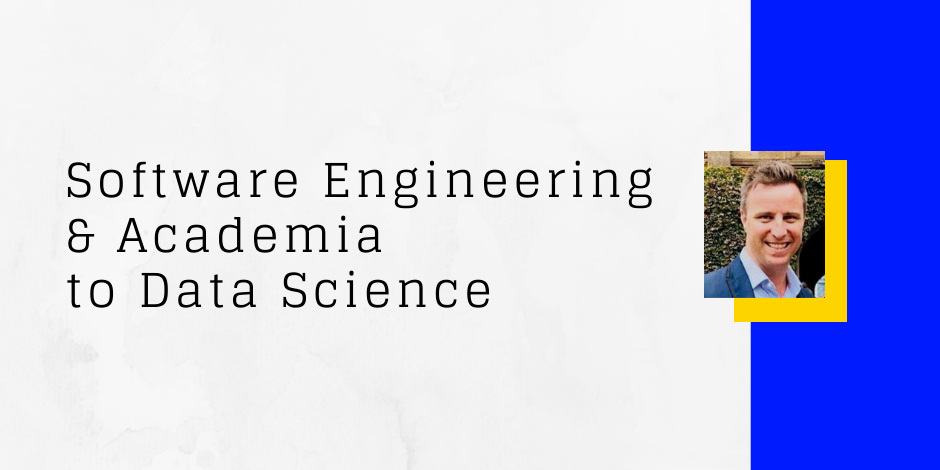Learn How Beau Transitioned to an Industry Role in Data Science

Stay Informed With Our Weekly Newsletter
Receive crucial updates on the ever-evolving landscape of technology and innovation.
The Institute of Data caught up with Beau who made a career change from academia to data science in 2019. Beau took on board what he learned in the part time program and secured a job before graduating from the program. This is his journey:
Can you explain your career before making the change to data science?
“I studied Physics and Astronomy at university before starting a career as a software engineer in the defence industry. I soon realised I wanted more of a challenge and missed the constant learning, so I went back to university to complete my PhD in Astrophysics. After completing this, I went back to the real world and worked as a data analyst, and now I have started a new role as a data scientist in a small consulting firm.”
What motivated you to pursue a career in data science after experience in academia?
“I saw many of my friends leaving academia after struggling to get long term roles. There isn’t a lot of opportunity for people to continue in research long term.”
How do methods involved in research in astrophysics compare to what you do now as a data scientist?
“The method of solving problems hasn’t changed, only the problems have changed. I still go through the scientific method to try to answer a hypothesis/question that has been posed to us by a client. The questions are definitely more relatable, and typically require a much faster turnaround than a 3 year PhD. I will occasionally get to try out some machine learning techniques that weren’t required for my research.”
What is one thing you know now that you wish you knew before changing careers from academia to industry?
“I wish I had known about all the meet-ups that I could have been going to. I have learned a lot about the industry and some of the problems they face. Meet-ups are a great place to learn more about data science as a whole and talk to people who work in various fields. This was a good way to figure out what industry I wanted to pursue with data science.”
Why did you choose to join the Data Science Part-Time Program in particular? What appealed to you?
“I wanted to be able to maintain my full time job while building on my skills. The part time nature and career assistance at the end of the program are the main things that appealed to me.”
How did you manage to land a new role before graduating from the program?
“I had been looking for a while and talking to a few people at meet-ups when someone told me about a role they had applied for and didn’t get. They said that the consultancy firm essentially had an open invitation for resumes, so I had a look and sent mine off.”
Tell us about your current data science role, what does your day to day involve?
“I’m part of a small consulting firm that deals with public transport data. We typically look at passenger behaviour and analysing the performance of buses, trains and ferries. I’m still new in the role, so there is still some learning I have to do about the products and procedures. However, I have already developed some tools to assist clients in their understanding of the performance of trains.”
What surprised you the most about your new job?
“I was a little surprised about the interview process. In the later stages, I was asked to come into work with them for a day to experience how they work together. The day with them required me to look at a real world example of trying to figure out if the buses were late. I spent the whole day collecting real time data for analysis over the weekend. I am also surprised at how fast I was able to actually start making a difference to client requests.”
How does your new data skillset assist you in this new role?
“My new role requires analysing data to inform our clients on their questions. We occasionally use some machine learning techniques to segment customers, to provide some insight into customer behaviour. There has also been some experimentation using object detection.”
How does your new data skillset assist you in this new role?
“My new role requires analysing data to inform our clients on their questions. We occasionally use some machine learning techniques to segment customers, to provide some insight into customer behaviour. There has also been some experimentation using object detection.”
What did you enjoy the most about the Capstone Project during the program?
“I have enjoyed the fact that I can investigate something that I am particularly interested in and exploring the business context around it. I’ve also enjoyed the project ideas that others have come up with.” You can read more about Beau’s Capstone Project here and here.
Do you have any advice for professionals making a career change to data science?
“I think the best advice I could give is to talk to people in the industry and go to meet-ups. You can learn so much about various fields that use machine learning. Also start developing a portfolio of projects that you can show to potential employers.” Read more from Beau here.
If you are interested in up-skilling and landing a role in the Data Science & AI industry, book a consultation with a Data Industry Career Consultant today.


